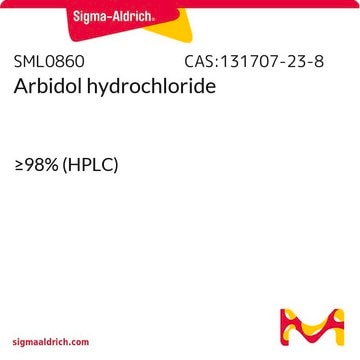T7204
Toremifene citrate salt
≥98% (HPLC)
Synonym(s):
(Z)-2-(4-(4-Chloro-1,2-diphenyl-1-butenyl)phenoxy)-N,N-dimethylethanamine, Acapodene, Fareston, GTx 006, Z-Toremifene
About This Item
Recommended Products
Assay
≥98% (HPLC)
form
powder
storage condition
desiccated
color
white to off-white
solubility
DMSO: >10 mg/mL
storage temp.
2-8°C
SMILES string
OC(=O)CC(O)(CC(O)=O)C(O)=O.CN(C)CCOc1ccc(cc1)C(=C(\CCCl)c2ccccc2)\c3ccccc3
InChI
1S/C26H28ClNO.C6H8O7/c1-28(2)19-20-29-24-15-13-23(14-16-24)26(22-11-7-4-8-12-22)25(17-18-27)21-9-5-3-6-10-21;7-3(8)1-6(13,5(11)12)2-4(9)10/h3-16H,17-20H2,1-2H3;13H,1-2H2,(H,7,8)(H,9,10)(H,11,12)/b26-25-;
InChI key
IWEQQRMGNVVKQW-OQKDUQJOSA-N
Gene Information
human ... ESR1(2099) , ESR2(2100)
General description
Application
- in cell-based ELISA
- as a positive control to detect its antiviral activity against Ebola virus (EBOV)
- to treat MCF7 and T47D breast cancer cell lines
Biochem/physiol Actions
Features and Benefits
Preparation Note
Signal Word
Danger
Hazard Statements
Precautionary Statements
Hazard Classifications
Acute Tox. 4 Oral - Aquatic Acute 1 - Aquatic Chronic 1 - Eye Dam. 1
Storage Class Code
11 - Combustible Solids
WGK
WGK 3
Flash Point(F)
Not applicable
Flash Point(C)
Not applicable
Certificates of Analysis (COA)
Search for Certificates of Analysis (COA) by entering the products Lot/Batch Number. Lot and Batch Numbers can be found on a product’s label following the words ‘Lot’ or ‘Batch’.
Already Own This Product?
Find documentation for the products that you have recently purchased in the Document Library.
Customers Also Viewed
Articles
We offers many products related to Nuclear Receptors (Steroids) for your research needs.
Our team of scientists has experience in all areas of research including Life Science, Material Science, Chemical Synthesis, Chromatography, Analytical and many others.
Contact Technical Service
















